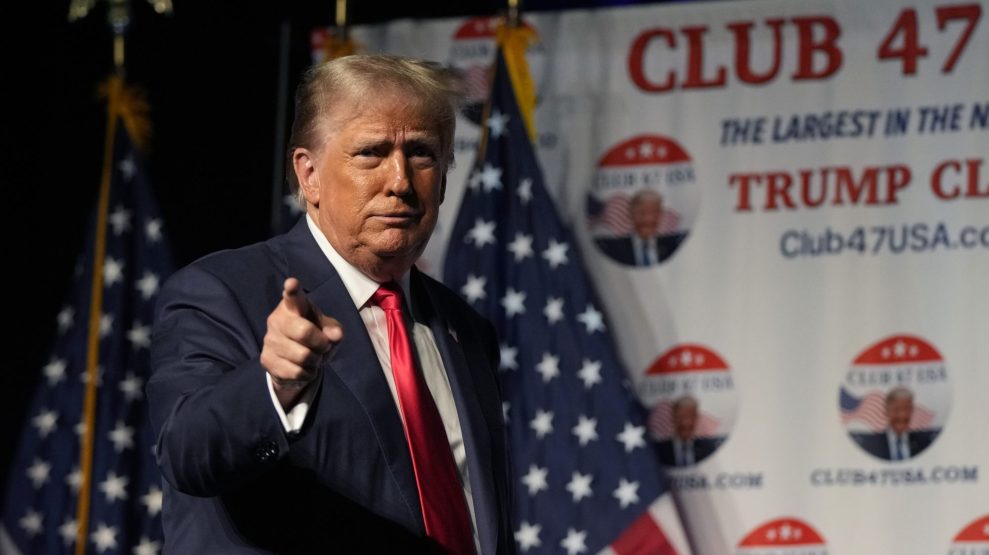
Rebecca Blackwell/AP
A former Deutsche Bank executive testified this week that the German financial behemoth only agreed to make massive loans to Donald Trump because of Trump’s vast personal fortune. The problem? The bank apparently thought, based at least partly on financial statements provided by Trump, that he was far wealthier than he really was.
The Deutsche Bank exec, Nicholas Haigh, was testifying in Manhattan as part of New York Attorney General Letitia James’ $250 million civil fraud lawsuit against Trump. Going over internal documents in court with Haigh, James’ attorneys showed that the bankers didn’t really believe all of Trump’s claims about his wealth. They estimated that Trump was significantly less wealthy than he claimed, but they were still convinced that he had more money than he really did.
James contends that Trump didn’t have anywhere near enough wealth to qualify for the loans he received, and she alleges that the financial statements he gave to Deutsche and other institutions were fraudulent because he vastly over-valued his real estate properties. New York judge Arthur Engoron, who is overseeing the case, has already ruled that he agrees—the ongoing trial involves a handful of lesser allegations over the paperwork and will also determine how much of a fine Trump should have to pay.
Trump and his legal team have largely declined to try to argue the facts of the case. The former president’s comments on the ongoing proceedings have mostly been limited to angry outbursts accusing James of pursuing a political or racist agenda. (James is Black.) Wednesday’s testimony highlighted just how hard it is for Trump to deny the allegations. As James’ attorneys repeatedly showed in court, not only did Trump sign his name to documents listing incorrect values for his properties, the banks largely believed what he told them and made their decisions based on his claims.
According to the documents and Haigh’s testimony, at least one of the transactions required that Trump maintain a net worth of at least $2.5 billion to avoid defaulting on the loan. At the time, Trump claimed his net worth was well over $4 billion. But James’ office contends that it was actually only about $1.6 billion.
Haigh testified that when Trump approached the bank for loans, he offered several properties as collateral, including his Doral golf course and his Chicago hotel and condo building. Those properties alone, Haigh said, would not ordinarily have been enough. Haigh, who was head of risk assessment for the Deutsche’s private wealth management division—a division that handles banking for very wealthy clients—said that it was unusual for a customer to try to offer those types of properties as collateral.
“In general terms, my conclusion was the client owned a lot of real estate, a lot of golf courses, which I didn’t know how to value,” Haigh said.
Fancy houses, works of art, or planes were more typical big-ticket items offered for collateral, he said. With Trump offering golf courses and condo projects instead, Haigh said, the bank relied on Trump’s guarantee that he could use his personal wealth to cover the loans if his business went bad. And, Haigh said, Deutsche agreed to that arrangement based on the documents Trump provided. James’ now charges that those same documents were fraudulent.
When Trump’s attorneys had an opportunity to cross-examine Haigh, they once again didn’t attempt to discredit either Haigh or the documents. Instead, they wheedled out of him an admission that Deutsche Bank had not lost money lending to Trump—even if Trump had deceived the bank when he asked for the loans. But, he said, the transaction was still flawed because the terms of the loan—for example, the interest rates Trump was charged—didn’t reflect the true risk that Trump represented. Or, put another way, whether Trump paid the loans back or not, Deutsche Bank would have likely charged him higher interest rates and made more money from the deal had bank executives known the true state of Trump’s finances.
A key part of Trump’s defense in the case has been that no one was really hurt by the deceptions, so James has no reason to sue him for fraud. Judge Engoron rejected that idea in his ruling before the trial. He found that Trump had indeed committed fraud and noted that even if fraud doesn’t cause a loss to anyone, it can undermine the stability and credibility of the financial system.
Although James’ attorneys didn’t mention it during Haigh’s testimony, at the time Trump was applying for the Deutsche loans, Trump did have a very recent history of failing to pay back banks. Prior to pursuing loans with the private wealth management division of Deutsche Bank—where Haigh worked—Trump had borrowed billions from Duetsche’s separate commercial division, the part of the bank that usually lends money for projects like golf courses and hotels. In fact, in 2008, when he owed Deutsche Bank $640 million for his Chicago tower, Trump came up short and filed a multi-billion dollar lawsuit against Deutsche, accusing the bank of helping cause the global financial crisis, which he argued had crippled his business and made it difficult to repay that loan.
Part of the eventual resolution of the lawsuit over that bad loan was a re-financing deal in which, according to James, Trump lied about his wealth. Trump also struggled to pay back a second loan on his Chicago project—$130 million that he owed to a hedge fund called Fortress Investment Group. Trump eventually settled that loan for $48 million, with Fortress forgiving the rest.
















